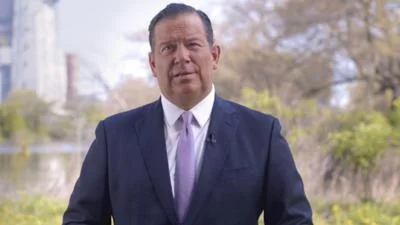When the shopping spree started back in 1998, Orland Park Mayor Dan McLaughlin was warned.
One trustee asked village leaders “not do something comparable to going to Disney World on a credit card.”

Orland Park Mayor Dan McLaughlin has presided over massive village borrowing that is now impacting property values.
| Youtube
They would do that, and then some.
A recreation center. A pool. A fund to buy vacant land. Renovating a shopping district. More employees. Higher salaries.
Two decades and some $234 million in debt later, the bill for McLaughlin’s borrowing and building, hiring and public employee pension-increasing has come due.
The mayor, 63, is preparing for retirement. Orland Park property owners are girding themselves for years of suffocating property taxes.
Orland Park’s decades of debt
In 1998, McLaughlin was midway through his second term in office. Orland Park had 47,583 people, 742 employees and $14 million in municipal debt, according to the Illinois State Comptroller.
In 2015-- his sixth term-- it had a population of 56,767, 1,057 employees on its payroll, and $119 million in debt.
That’s 19 percent more people, 42 percent more government employees, and 725 percent more debt.
In contrast, over the same period, Tinley Park grew 25 percent in population (45,194 to 56,703), but only has 427 employees on its payroll and $31 million in municipal debt, one-fourth of its nearly identical-in-size neighbor.
Orland Park residents also owe another $119.2 million in pension debts for retirees, thanks in part to the large increase in village payroll. That includes for McLaughlin himself, whose salary increased from $40,000 to $150,000 last year, meaning his starting pension will be $110,000, not $30,000.
If he retired today, over 30 years McLaughlin would collect $5.2 million in pension payments, plus taxpayer-funded health care benefits.
According to the Illinois Dept. of Insurance, Orland Park’s police pension debt more than tripled from 2007 to 2015, from $7 million to $24 million. The village also owes $61 million to retired firefighters and $20 million to retired village employees like McLaughlin.
These pension debt estimates are conservative, according to University of Chicago Nobel Prize-Winning economist (and Beverly Country Club member) Eugene Fama, who believes they are three times as high.
All told, every Orland Park household owes $10,747 in village debt-- $21,662 if you believe Fama’s estimate over the state’s-- or 2-4 years worth of a typical Orland Park homeowner property tax bill.
Property taxes up, home values down
An analysis of historical real estate values by Local Government Information Services (LGIS), which publishes South Cook News, shows how Orland Park’s debt has weighed on the local real estate market.
In inflation-adjusted dollars, median home values in Orland Park grew 10 percent from 1980 to 2000, to $286,845 from $261,428. They grew another 31 percent between 2000 and 2007-- to $374,904.
But by 2015, the median home price in Orland Park had fallen 34 percent. In real dollars, it is actually lower today than it was in 1980.
According to Blockshopper.com, the median sale price in Orland Park in 2016 was $222,500 and the median property tax bill was $5,528, an effective tax rate of 2.49 percent, or about three times what it is in Indiana (0.88 percent).
Since 2007, home values in all southwest Cook County and Will County suburbs have fallen, according to LGIS. But in Orland Park, they have fallen the most among its peers, 34.4 percent versus Tinley Park (34.3%), Homer Glen (27.2%), New Lenox (24.7%), Mokena (21.3%) and Frankfort (17.8%).
McLaughlin faces entrepreneur and Air Force veteran Keith Pekau in the April 4 election.
Home Values, Southwest Suburbs, 1990 to 2015
| Name | 1980 | 1990 | 2007 | 2015 |
| Orland Park | $261,428 | $276,845 | $374,904 | $246,000 |
| Tinley Park | $187,803 | $210,127 | $293,751 | $193,000 |
| New Lenox | $192,404 | $197,980 | $326,898 | $246,000 |
| Mokena | $188,090 | $209,402 | $340,614 | $268,000 |
| Frankfort | $240,721 | $297,513 | $397,764 | $327,000 |
All prices inflation-adjusted






 Alerts Sign-up
Alerts Sign-up